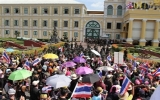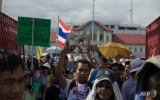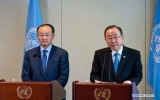Thai clashes leave 2 dead, military chief offers to mediate
Update: 02-12-2013 | 00:00:00
Thai police on December 1 fired tear gas and water cannons at protesters trying to force their way into Government House to overthrow Prime Minister Yingluck Shinawatra, after violence in the capital left two dead and dozens wounded.
 Tensions ran high after violence broke out on November 30 around a suburban stadium where tens of thousands of pro-government "Red Shirts" had gathered in support of Yingluck, who has faced weeks of street protests.
Authorities are deploying nearly 3,000 troops to reinforce security in Bangkok, the first time a significant number of soldiers has been deployed to cope with the recent unrest.
The violence prompted Red Shirt leaders to end their rally.
"In order to avoid further complicating the situation for the government, we have decided to let people return home," Red Shirt leader Thida Thavornseth told the crowd.
Yingluck was not present at the time of the clashes. The government denied rumours that she has fled the country but her whereabouts are currently unknown.
On December 1 the Chinese news agency Xinhua reported that Thai Army Chief General Prayuth Chan-ocha had urged two sides of the conflict to reconcile, asking the police to stop using tear gas and the protestors to stop the occupation of buildings.
Meanwhile, the Bangkok Post cited a Puea Thai Party senior official as saying that the dissolution of the Lower House has been agreed as the last solution to end the political crisis for the present.
Protests were triggered by an amnesty bill that opponents feared would have allowed the return of former Premier Thaksin Shinawatra, whose overthrow by royalist generals in 2006 unleashed years of political turmoil.
VNA
Tensions ran high after violence broke out on November 30 around a suburban stadium where tens of thousands of pro-government "Red Shirts" had gathered in support of Yingluck, who has faced weeks of street protests.
Authorities are deploying nearly 3,000 troops to reinforce security in Bangkok, the first time a significant number of soldiers has been deployed to cope with the recent unrest.
The violence prompted Red Shirt leaders to end their rally.
"In order to avoid further complicating the situation for the government, we have decided to let people return home," Red Shirt leader Thida Thavornseth told the crowd.
Yingluck was not present at the time of the clashes. The government denied rumours that she has fled the country but her whereabouts are currently unknown.
On December 1 the Chinese news agency Xinhua reported that Thai Army Chief General Prayuth Chan-ocha had urged two sides of the conflict to reconcile, asking the police to stop using tear gas and the protestors to stop the occupation of buildings.
Meanwhile, the Bangkok Post cited a Puea Thai Party senior official as saying that the dissolution of the Lower House has been agreed as the last solution to end the political crisis for the present.
Protests were triggered by an amnesty bill that opponents feared would have allowed the return of former Premier Thaksin Shinawatra, whose overthrow by royalist generals in 2006 unleashed years of political turmoil.
VNA
 Tensions ran high after violence broke out on November 30 around a suburban stadium where tens of thousands of pro-government "Red Shirts" had gathered in support of Yingluck, who has faced weeks of street protests.
Authorities are deploying nearly 3,000 troops to reinforce security in Bangkok, the first time a significant number of soldiers has been deployed to cope with the recent unrest.
The violence prompted Red Shirt leaders to end their rally.
"In order to avoid further complicating the situation for the government, we have decided to let people return home," Red Shirt leader Thida Thavornseth told the crowd.
Yingluck was not present at the time of the clashes. The government denied rumours that she has fled the country but her whereabouts are currently unknown.
On December 1 the Chinese news agency Xinhua reported that Thai Army Chief General Prayuth Chan-ocha had urged two sides of the conflict to reconcile, asking the police to stop using tear gas and the protestors to stop the occupation of buildings.
Meanwhile, the Bangkok Post cited a Puea Thai Party senior official as saying that the dissolution of the Lower House has been agreed as the last solution to end the political crisis for the present.
Protests were triggered by an amnesty bill that opponents feared would have allowed the return of former Premier Thaksin Shinawatra, whose overthrow by royalist generals in 2006 unleashed years of political turmoil.
VNA
Tensions ran high after violence broke out on November 30 around a suburban stadium where tens of thousands of pro-government "Red Shirts" had gathered in support of Yingluck, who has faced weeks of street protests.
Authorities are deploying nearly 3,000 troops to reinforce security in Bangkok, the first time a significant number of soldiers has been deployed to cope with the recent unrest.
The violence prompted Red Shirt leaders to end their rally.
"In order to avoid further complicating the situation for the government, we have decided to let people return home," Red Shirt leader Thida Thavornseth told the crowd.
Yingluck was not present at the time of the clashes. The government denied rumours that she has fled the country but her whereabouts are currently unknown.
On December 1 the Chinese news agency Xinhua reported that Thai Army Chief General Prayuth Chan-ocha had urged two sides of the conflict to reconcile, asking the police to stop using tear gas and the protestors to stop the occupation of buildings.
Meanwhile, the Bangkok Post cited a Puea Thai Party senior official as saying that the dissolution of the Lower House has been agreed as the last solution to end the political crisis for the present.
Protests were triggered by an amnesty bill that opponents feared would have allowed the return of former Premier Thaksin Shinawatra, whose overthrow by royalist generals in 2006 unleashed years of political turmoil.
VNA
 Malaysia's digital economy projected to reach 31 billion USD in 2024
Malaysia's digital economy projected to reach 31 billion USD in 2024
 Opportunity to enhance the position of the Global South
Opportunity to enhance the position of the Global South
 Thailand to build new bridge to Cambodia
Thailand to build new bridge to Cambodia
 Bulgaria charts new course with Vietnam on President’s upcoming visit: Diplomat
Bulgaria charts new course with Vietnam on President’s upcoming visit: Diplomat
 Seminar seeks ways to boost ASEAN - Latin America connectivity
Seminar seeks ways to boost ASEAN - Latin America connectivity
 Indonesia seeks India's help in health education
Indonesia seeks India's help in health education
 Indonesia named world's most generous country in 2024
Indonesia named world's most generous country in 2024
 Philippines: Over-4m-high floodwaters make thousands of houses submerged
Philippines: Over-4m-high floodwaters make thousands of houses submerged
 Singapore’s public sector records carbon reduction in 2023
Singapore’s public sector records carbon reduction in 2023
 Pressure facing the EU on its growth track
Pressure facing the EU on its growth track



